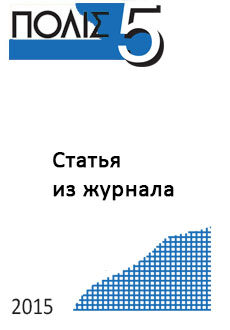Online shop of "Polis. Political Studies" Journal
We in the world, the world in us
Critical State of an Environment: the Methodology and Theoretical Issues
Free!
The author substantiates the necessity of development of the ‘science of the critical states’ of a society and its cities as an integrated branch of interdisciplinary knowledge and know-how. Recently, the situation of a critical, that is, urgent state has become a normal modus vivendi of various communities and societies across the world. The economic and/or political crises come up and down but the critical areas are still mushroomed elsewhere. The theoretical and methodological basement of this new branch of science is the concept of ‘society of all-embracing risk’ proposed and developed by the author in 1980?90s. The subject matter of the proposed complex discipline is the forces which generate the critical situations; their disposition, resources and strength; their values, strategies, tactics and action repertoire; an environmental dimension of the emergence and evolution of such situations; a changing quality of social capital of affected people, local and abroad; and characteristics of post-critical states and politics of their rehabilitation. The indispensable prerequisites for the establishing of such discipline are as follows: full-time integration of various natural, technical and social professionals and politicians; a capability of such interdisciplinary teams to play a double-role of insider and outsider in relation to a critical situation; and a long-term and permanent monitoring of its evolution.
 English
English Русский
Русский

Reviews
There are no reviews yet.